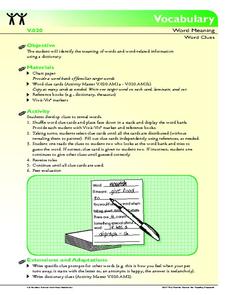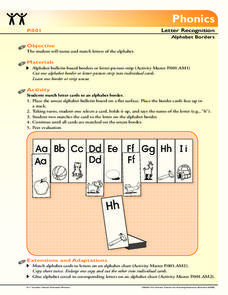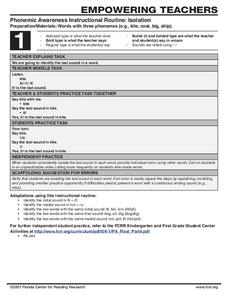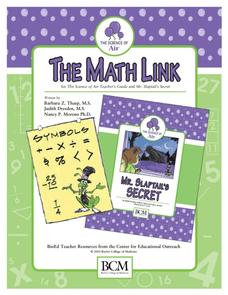Florida Center for Reading Research
Phonological Awareness: Phoneme Segmenting, Phoneme Closed Sort
Build phonological awareness with an activity that challenges learners to sort picture cards based on the number of phonemes each has.
Florida Center for Reading Research
Phonemic Awareness: Phoneme Segmenting, The Phoneme Game
Early readers play a board game to practice segmenting phonemes. Players determine how many spaces to move by choosing a picture, saying the object's name on the card, then counting the phonemes they say.
Florida Center for Reading Research
Phonological Awareness: Syllables, Clapping Names
Scholars practice identifying and counting syllables. Images of classmates are cut out and placed on a chart. Learners clap and count the syllables in each child's name. They finish by writing the number of syllables under the...
Florida Center for Reading Research
Phonological Awareness: Phoneme Matching, Sound Maker - Sound Smacker
Scholars sort words based on their initial phonemes. They choose cards, say their names, and match the initial phoneme to the one posted on one of the sorting bins. If the initial sound matches, they put the card in the sound maker bin,...
Florida Center for Reading Research
Phonics: Onset and Rime, Change-A-Word
Kids use their phonological know-how to identify and segment onset and rime blends. Double rime picture cards (cat and hat) are chosen, then matched to onset cards that make each word, such as the k sound for a cat and the h sound for a...
Florida Center for Reading Research
Vocabulary: Word Meaning, Word Clues
Young learners develop a deeper understanding of target vocabulary. In pairs, pupils independently complete a series of word clue cards, asking them to find information about key terms, including their definitions, synonyms, antonyms,...
Florida Center for Reading Research
Phonics: Letter Recognition, Alphabet Borders
Reinforce early reading skills with an activity focusing on letter recognition. Class members work in pairs to match uppercase and lowercase letters of the alphabet.
Florida Center for Reading Research
Vocabulary: Words in Context, Pun Fun
Scholars explore a variety of texts to locate wordplay. Partners read their selections and discuss meanings.
Florida Center for Reading Research
Phonological Awareness: Onset and Rime, Guessing Game
An activity challenges scholars to show what they know about onset and rime. Learners choose from a stack of picture cards and give onset and rhyming clues to see if their partners can guess the word they are holding.
Virginia Department of Education
Identifying the Main Idea in Fiction
Discovering the main idea in fiction is like uncovering buried treasure; one must persevere to locate it, and the reward is priceless. Scholars delve deep into leveled stories using three questions to aid in identifying the main idea.
Apple State University
Friendly Letter Mini-Lesson
This mini-instructional activity about informal letter writing is packed with a lot of information about writing a friendly letter. Class members begin by working in pairs to answer questions after reviewing letter models. Then, take...
Florida Center for Reading Research
Phonological Awareness: Phoneme Matching, Sound Bags
Peers pair up to find, identify and match medial phonemes. Peer one pulls a card or object from a bag, names it, then says its medial sound.—peer two attempts to find a picture or object whose medial sound matches the partner.
Baylor College
Water: Post-Assessment
Very simply, the science class will discuss what they have learned during The Science of Water unit and take a multiple-choice post-assessment quiz. A few other closing activities are suggested for you to choose from, such as having...
Mathed Up!
Enlargements
Make enlargements with and without centers. Pupils work through seven problems dealing with dilations or enlargements. The first couple items are strict enlargements without centers, while the others have centers. Class members also...
Curated OER
Phonemic Awareness Instructional Routine: Isolation
This phonemic awareness activity would be great for morning meeting or circle time. Teacher calls out a word, s/he identifies the final phoneme. The class then take turns saying other simple or cvc words that also have the same ending...
EngageNY
Construct a Square and a Nine-Point Circle
Anyone can draw a square, but can you CONSTRUCT a square? Here is a resource that challenges math scholars to create steps to finish their own construction. They test their ability to read and follow directions to complete a construction...
Baylor College
Air: The Math Link
Inflate this unit on the science of air with these math skills practice and word problems. Accompanying the children's story Mr. Slaptail's Secret, this resource covers a wide range of math topics including the four basic...
Curriculum Corner
Winter Multiplication and Division Problem Solving Task Cards
A set of 18 winter-themed multiplication and division word problems is perfect for your math centers right before the holidays. Each problem is numbered and represented on a task card. Young mathematicians write their answers on a...
Curriculum Corner
Coniferous and Deciduous Trees
What are the differences between coniferous and deciduous trees? Supplement your tree lessons with a set of activities that has learners describing, naming, comparing, and reading about deciduous and coniferous trees. The activities are...
Novelinks
Tuck Everlasting: Similes, Metaphors, and Personification in Imagery
Poetic language is abundant in Natalie Babbitt's beautiful novel, Tuck Everlasting. Learners note the examples of similes, metaphors, and personification they find as they read, and illustrate how the language creates a sensory...
California Education Partners
The Road Not Taken
An effective lesson plan truly can make all the difference. Seventh graders read, analyze, and annotate Robert Frost's "The Road Not Taken" before writing an essay about what they believe to be the theme of the iconic poem.
Curated OER
Activity Guide for Snow
Create a cross-curricular learning experience around a shared reading of Cynthia Rylant's book Snow. From writing poetry and a singing a song about snow, to creating paper snowflakes and solving math story problems, this resource...
Santa Ana Unified School District
The Power of Point of View
Sometimes a whole story can change based on the perspective of the person telling it. Practice identifying and analyzing point of view in various reading passages and writing assignments with a language arts packet, complete with Common...
Smithsonian Institution
Water/Ways: The Poetry of Science
Water is the source of life. It appears in poetry in both peaceful and torrential descriptions; it appears in earth science in its liquid, gaseous, and solid states. Combine these interpretations of our planet's most precious and...
Other popular searches
- Context Clue Reading Centers
- Hands on Centers Reading
- Guided Reading Centers
- Constitution Reading Centers
- 2nd Grade Reading Centers
- Kindergarten Reading Centers
- Mangement of Reading Centers
- Constituiton Reading Centers
- Management of Reading Centers
- Centers for Reading























